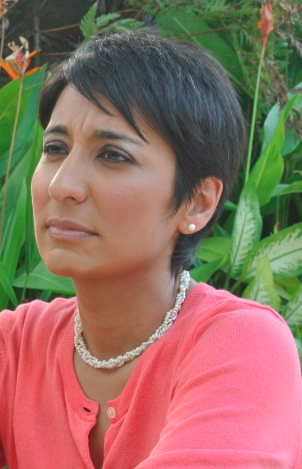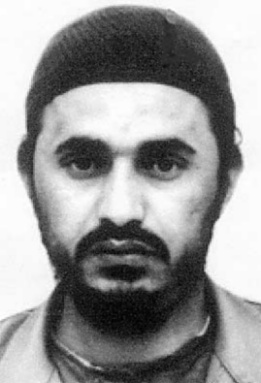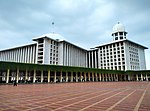Related Research Articles

Jemaah Islamiyah is a Southeast Asian Islamist militant group based in Indonesia, which is dedicated to the establishment of an Islamic state in Southeast Asia. On 25 October 2002, immediately following the JI-perpetrated 2002 Bali bombings, JI was added to the UN Security Council Resolution 1267.

Irshad Manji is a Ugandan-born Canadian educator. She is the author of The Trouble with Islam Today (2004) and Allah, Liberty and Love (2011), both of which have been banned in several Muslim countries. She also produced a PBS documentary in the America at a Crossroads series, titled Faith Without Fear, which was nominated for an Emmy Award in 2008. A former journalist and television presenter, Manji is an advocate of a reformist interpretation of Islam and a critic of literalist interpretations of the Qur'an.

Abu Bakar Ba'asyir also known as Abu Bakar Bashir, Abdus Somad, and Ustad Abu is an Indonesian Muslim cleric and leader of Jamaah Ansharut Tauhid.

Hamzah Haz is an Indonesian politician who served as the ninth vice president of Indonesia from 2001 to 2004 under President Megawati Sukarnoputri. Prior to serving as vice president, Hamzah served as a cabinet minister and a member of the People's Representative Council (DPR). He also chaired the United Development Party (PPP) from 1998 to 2007, and was the party's presidential candidate in the 2004 Indonesian presidential election.

Playboy Indonesia is a franchise of Playboy magazine in Indonesia. The magazine was first published in April 2006. It is published by Velvet Silver Media and edited by Erwin Arnada. This edition of the magazine is notable in that it features no nudity and that it is the first Playboy to be published in a Muslim-majority country since a Turkish edition that was discontinued in the mid-1990s.

Abu Musab al-Zarqawi, born Ahmad Fadeel al-Nazal al-Khalayleh, was a Jordanian jihadist who ran a terrorist training camp in Afghanistan. He became known after going to Iraq and being responsible for a series of bombings, beheadings, and attacks during the Iraq War, reportedly "turning an insurgency against US troops" in Iraq "into a Shia–Sunni civil war". He was sometimes known by his supporters as the "Sheikh of the slaughterers".
Mujahedeen KOMPAK or KOMPAC is a Darul Islam organisation based in Indonesia's Sulawesi island. Formed in 1988 with the stated aim of helping victims of conflict and disaster, it has been linked to providing funding for terrorist organisations such as Jemaah Islamiyah as well as carrying out attacks on local Christian groups. The organisation has been accused of diverting relief funds from mainstream Muslims in Australia and abroad to fund terrorist activities.
The Al-Mukmin Islamic boarding school also known as Pesantren Al-Mukmin and Pondok Ngruki, is a pesantren located in Ngruki, a suburb in the regency of Sukoharjo, Central Java, Indonesia. It was founded 1972 by the alleged 'spiritual head' of Jemaah Islamiyah, Abu Bakar Bashir, and by Abdullah Sungkar. Al-Mukmin's activities were initially limited to religious discussion after dhuhr. Following increasing interest, the founders expanded Al-Mukmin into a madrasah and then into a pesantren. It currently houses over 2000 students aged between 12 and 18.

The Jaish al-Mujahideen was a Sunni militant group in Iraq. The group first emerged in late 2004. The Mujahideen Army is one of the founding members of the Jihad and Reform Front as well as a member of the Political Council for the Iraqi Resistance (PCIR). The Mujahideen Army is comprised almost exclusively of native Iraqi Sunni Muslims, including ex-members of Saddam Hussein's military and security agencies such as Fedayeen Saddam, Special Republican Guard, Republican Guard and the Special Security Organization.
Istishhad is the Arabic word for "martyrdom", "death of a martyr", or "heroic death". One who martyrs themselves is given the honorific shaheed. The word derives from the root shahida, meaning "to witness". Traditionally martyrdom has an exalted place in Islam. It is widely believed among Muslims that the sins of believers who "die in the way of God" will be forgiven by Allah. Shia views on martyrdom have been profoundly influenced by internal Muslim conflicts, notably Husayn ibn Ali's martyrdom at Karbala in 680, shaping it as a central belief and practice.
Mujahideen, or Mujahidin, is the plural form of mujahid, an Arabic term that broadly refers to people who engage in jihad, interpreted in a jurisprudence of Islam as the fight on behalf of God, religion or the community (ummah).

The Mujahideen Shura Council in the Environs of Jerusalem or simply the Mujahideen Shura Council is an armed Salafi jihadist group linked to al-Qaeda that is active in Egypt's Sinai Peninsula and in the Gaza Strip. The group was formed in 2011 or 2012 by Salafist Islamist Hisham Al-Saedni to coordinate the activities of the Salafi jihadist groups operating in Gaza even before the Egyptian Revolution of 2011 and has carried out attacks against civilians in Israel. The group describes violence against Jews as a religious obligation that brings its perpetrators closer to God. Al-Saedni, who was the leader of the group and also of Jahafil Al-Tawhid Wal-Jihad fi Filastin, was killed in an Israeli airstrike in Gaza on 14 October 2012. The group is subordinated with Al-Qaeda in Sinai Peninsula as of August 2012.

The Islamic State of Iraq was a Salafi jihadist militant organization that fought the forces of the U.S.-led coalition during the Iraqi insurgency. The organization aimed to overthrow the Iraqi federal government and establish an Islamic state in Iraq.
Reactions to the execution of Saddam Hussein were varied. Some strongly supported the execution, particularly those personally affected by Saddam's actions as leader. Some of these victims wished to see him brought to trial for his other actions, alleged to have resulted in a much greater number of deaths than those for which he was convicted. Some believed the execution would boost morale in Iraq, while others feared it would incite further violence. Many in the international community supported Saddam being brought to justice but objected in particular to the use of capital punishment. Saddam's supporters condemned the action as unjust.

The East Indonesia Mujahideen was an Islamist militant group operating out of Poso, Central Sulawesi, Indonesia. The group was led by Abu Wardah until he was killed by Indonesian police on 18 July 2016. After the death of Santoso, the group was led by Ali Kalora until he was killed on 18 September 2021. The group has pledged allegiance to the Islamic State.
Jamaah Ansharut Daulah is an Indonesian terrorist group that has been reported to be linked to the 2018 Surabaya bombings as well as the 2019 Jolo Cathedral bombings. The Islamic State of Iraq and the Levant (ISIL) has been reported as claiming responsibility for both attacks. The group had been identified by the United States Department of State as a terrorist organization in 2017. It is banned by Iraq and Indonesia. It is also listed as a terrorist organization by the United Nations Security Council on 4 March 2020.
In July 2005, Indonesian Ulema Council (MUI), a semi-official Islamic clerical body of Indonesia, issued a fatwa, or an Islamic legal opinion, against religious pluralism, liberalism, and secularism. The issuance of fatwa garnered substantial controversy and scholarly attention. The fatwa addressed the reformist trend of Islam which had been popular among the broad Indonesian society over the past 25 years. Such trends advocated for a more substantive reading of the Quran and Hadith, instead of literalist approaches taken by the majority of ulamas. MUI considered such ideas as incompatible with Islamic teaching, releasing the fatwa to promote a more literal reading of the Islamic scriptures. The fatwa was heavily criticized by progressive Muslim intellectuals.
Mujahideen is the plural of mujahid, one engaged in jihad.
Abdul Qodir Hasan Baraja is an Indonesian cleric, and the founder and Caliph of Khilafatul Muslimin. He is a former Darul Islam activist, and Komando Jihad combatant which was active during late 1970s to 1980s.
References
- ↑ Caleb Weiss (14 June 2017). "US designates Indonesian-based jihadist group". Long War Journal . Retrieved 15 June 2017.
- 1 2 "OPINION: Attacks on Muslim minorities by radicals on the rise in Indonesia". The New Straits Times Online. 2008-01-01.
- ↑ "Hardliners call for war on US". The Age. Melbourne. 2005-05-23.
- ↑ "World leaders welcome, condemn Saddam's execution". The Hindu News Update Service. Chennai, India. December 30, 2006. Archived from the original on December 23, 2007.
- ↑ "Row Over Dogma Splits Indonesia's Jihadi Extremists". 10 September 2008. Archived from the original on 26 August 2014.
- ↑ Supriyatno, Agus; Afriatni, Ami (2005-01-10). "Relawan Majelis Mujahidin Diusir dari Aceh" [Majelis Mujahidin Volunteers Expelled From Aceh]. Tempo (in Indonesian). Retrieved 2024-04-12.
- ↑ Sianipar, Tito (2005-01-05). "Kloter III Majelis Mujahidin Gagal Berangkat ke Aceh" [Majelis Mujahidin Group III Failed to Leave for Aceh]. Tempo (in Indonesian). Retrieved 2024-04-12.
- ↑ "Irshad Manji injured in mob attack in Yogya | the Jakarta Post". Archived from the original on 2013-03-10. Retrieved 2013-01-09.
